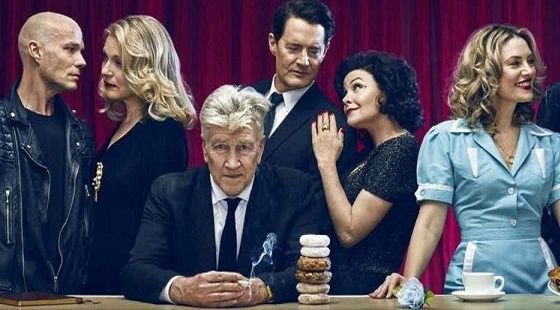
In the last few weeks of August, while I was eagerly awaiting the final two episodes of "Twin Peaks: The Return," I thought how I would sum up this last season of my favorite series. Every Monday in the summer, I was under the excitement that at the end of the working day I was expecting another escape from the familiar reality and immersion in the most intimate and secret corners of the remote North American town and its inhabitants. Then I eagerly gathered my thoughts about what I saw and experienced, trying to put the cadres in the context of my own understanding and my modest knowledge of TV entertainment. At the same time, I was curious about what they had experienced and which scene had earned the attention of everyone else, and when with joy, when with annoyance I found out that some interpreted what I saw as well, while others put it in a very different connotation.
However, the last two episodes of "The Return" reacted to all the familiar themes of the established world and even switched to new expansions, which turned the finale and, accordingly, the entire season into just as disturbing as Lynch's previous debut digital experiment - "Inland Empire".
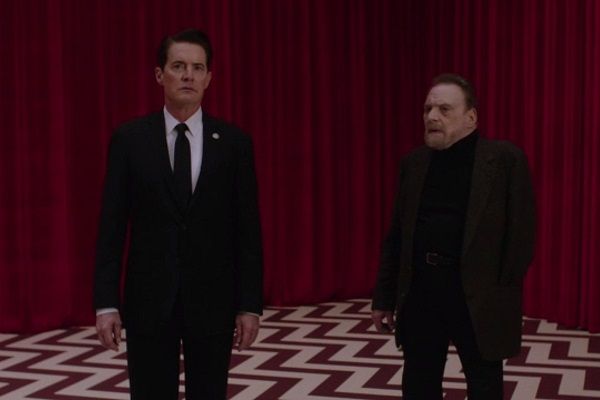
However, I recently read an excerpt from Dennis Limn's book "David Lynch: The Man from Another Place," where the author mentions how strongly Lynch despises the interpretation of his own work:
"Writing about David Lynch, it's hard to avoid his resounding voice in your mind, protesting against the violence you're inflicting on his work."
"The moment you tie what you see in words, no one is looking at the movie anymore," he told me a while ago. "That's what I hate. Speaking is very dangerous. "
Not surprisingly, his most beloved experiment in cinema ("Mulholland Drive"), "the one who actually works at 100%," as Roger Ebert writes, ends with the warning: "Silencio."
I sincerely believe that the amount of David Lynch's films we've seen before this season makes us more prepared for everything we've shown here, especially in the final 2 hours and their morbid structure. Moreover, as the director works mostly with a long number of familiar faces, the relationships between their characters in his other films work as mirror images in the Twin Peaks universe, and so reinforce some suggestions. For example, the fact that we do not know anything about the relationship between Diane and Cooper 25 years ago, the scenes with Laura Dern and Kyle McCullen point back to their relationship in the Blue Velvet.
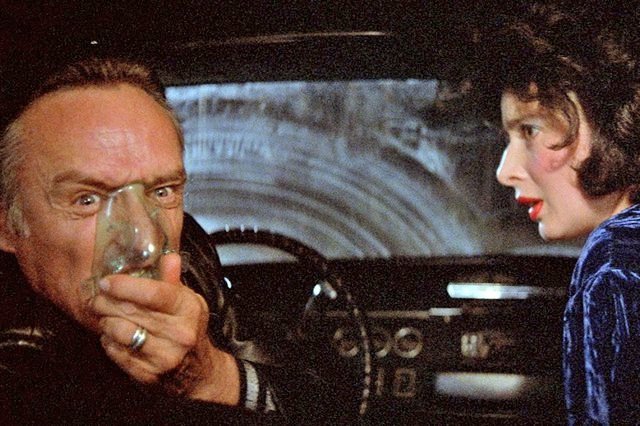
Blue Velvet
I don't believe that even his more accessible films, such as Wild Heart, Straight Story and Elephant Man, have some "last" directorial version in Lynch's head, in which version of the mysteries and strange circumstances kidnapping the screen, receive a final permit. This statement is more true than ever, relative to the last season of Twin Peaks, so I chose instead to look for permission for the dozens of stories we received during this 18-hour film to focus on cinematic techniques and their manipulation, thanks to which the most popular surrealist of our time shapes his works. The logic of dreams has no universal explanation, in their essence they are a strange materialisation of our own subconscious. In the case of Twin Peaks, the problems are related to the collective unconscious and looking at the series, we become a part of it as spectators, because the unfinished mysteries become clear in our mind thanks to our own inner world and intuition.
Lynch himself has repeatedly commented that his films are a set of ideas sewn together with cinema. From the completed ideas, however, usually only excerpts come to us. His films are structured so that the expectations that a scene creates in the viewer initially are lined up with the lining out at the end of the stage and often this is a material or metaphysical reason for the crazy behavior or appearance of his characters. The examples are countless, from Henry Spencer's shocked hairstyle, through the anomaly of John Merrick's face to roughly every Twin Peak character at a time.
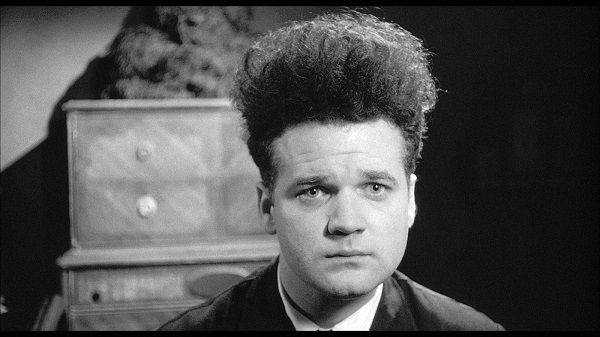
Eraserhead
This "strangeness", however, is not an end in itself, and works nicely with the rest of the visual elements, and particularly Lynch's attention to the details, thus attaching the viewer, binding it emotionally to what is happening on the screen. So no matter what genre or archetyp, Lynch almost always surprises, and this is one of the main features that inspired the feeling of freshness in Twin Peaks: Return. While the "Game of Thrones" was constantly rushing the action for a lot of fans, "Twin Peaks" seemed to slow down the time, placing us in a balloon whose location was somewhere outside our familiar television entertainment frameworks.
Whether we recognize a reference to the Sunset Boulevard or The Wizard of Oz, it does not end as we would expect. When the absurdity of a situation such as that of Dougie Jones for most of the season is not being subjected to serious questions by anyone, we start wondering if the experiences of the surrounding images are rational. Such parodying, however, often confirms the thought of the name of David Lynch, namely that in such an absurd world everything is possible and that is the most frightening. In the new season, the director chose to give us more than 15 hours of show, and in almost every episode we witnessed at least one moment when we were expecting electric lighting and the appearance of good old agent Dale Cooper. Reversing the expectations, thanks to which the series gained a slightly more entertaining style (good examples are the scene in the elevator with Dougie Jones as well as my personal favorite with the chocolate bunny) and free time to develop the mythology of the world and the stories about the new characters with the content of ( at least at first glance) a business cards.
Lynch's direction reveals worlds whose laws have nothing to do with our own reality, and therefore they lack of rules that we can perceive rationally and engage in words. This creates constant tension and curiosity, leaving us emotionally open to the next surprise. Just as the opening of the blue box in the Mulholland Drive pulls the camera deeper into the nightmare, so in the new season, the boundaries of the series were demolished in episode 14 when David Lynch, Gordon Cole, destroyed the fourth wall, telling his dream of Monica Bellucci . "It's all a dream, but who is the dreamer?".
Following the rich tradition of surrealism and drawing inspiration from the peculiarities of dreams and wishes, Lynch saturates ordinary objects with abnormal meaning, and this season we can multiply, but for the sake of fruition here I will confine myself to the first ones that come to my mind: the key from Cooper's hotel room, the Briggs living room chair and the green glove that Freddie beat Bob's flying essence.

Twin Peaks: The Return
Above the cowboy conflict at Sheriff Truman's office, she felt that she would always tie the endless scattered fragments of the narrative. Once in the protracted momentum that unfolded in Episode 17, it seemed as if everything had come into place and the puzzle gradually cleared a picture where good would win, the dreamer turned to Agent Cooper and visually it was delivered with the overlap of the frame in which Kyle McClock stared at us, the viewers. Cooper was the central character of this season, whether we watched the wanderings of Douglas Jones or the cruel killings of Mr C. As it turned out, everyone else was available to help him on the way back, some accompanied by the Fireman's supernatural presence and other, more common role models, such as Bushnell, Jane-I and Soni Jim, relying on values like love, honor and kindness.
Toward the end of episode 17, Cooper, in the next meta-reference, turned to everyone present as an actor performing the lead role in the theater: "I'll see you at the curtain call." Thus curtains have acquired the symbolism not only of the paranormal dimension of the Red Room, but also of those we find the actors at the end of a theatrical performance or a ballet show. Cooper laconically said that he was about to step out of the stage and venture into our world, where the Palmer family house is actually owned by the woman (Mary Rober) who appears at the door and who is not an actress in the skin of a fictional image, but a very real person.
Looking back at "Fire, Follow Me", which inevitably directs so many of the turns in the final, we understand that the older Mrs. Tremont and Shalphont have always been part of our world. But even assuming that the entire Twin Peaks is just a dream that would not be quite true, his messages and irresistible impact do not lose his charm, as is the case with all the other David Lynch films. These sporadic manifestations of our reality in the Twin Peaks art world have been part of the whole season, and have been particularly distinguished in the history of the unfinished Twin Peace princess, Audrey Horn. After the pains spread in 4 episodes, opening the door to his home and visiting The Bang Bang Bar, Audrey arrived there to discover that Eddie Vedder was not represented with his stage name, and with his baptized Edward Lewis Severson III. The infamous "Audrey Dance" was also presented as it is known to fans and should not be popular in the fictional limits of the show.
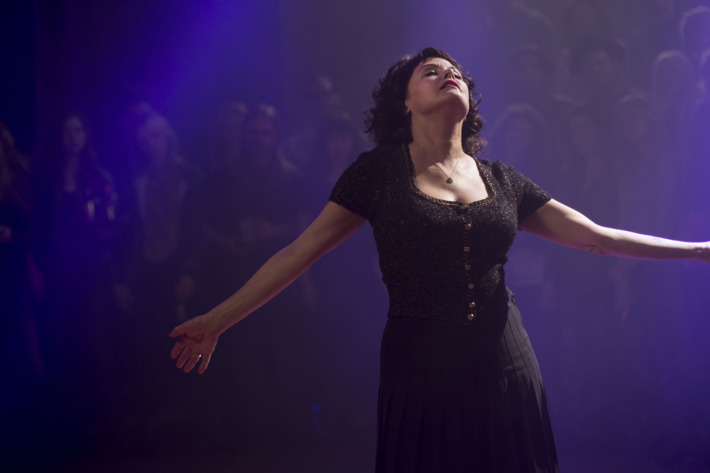
Twin Peaks: The Return, the dance of Audrey Horne
By crushing Cooper's character in two halves, the holy fool Dougie and the wicked monster, Mr C., Frost and Lynch, made a deconstruction of various familiar features from the beloved agent and, at the same time, the modern archetype of the character. That's why he alone traveled between the dimensions and the poses, "The Return" in the title got a new meaning with the deployment of his Odyssey back to Twin Peaks. He alone had the ability to go back in time to carry out the plan he had been exposed to in the first minutes of the Fireman season. Cooper thought that on the other side where they were going with Diane, things might have been different, but with the aim of preventing the death of Laura Palmer, the effort was worth it. That's why the agent slammed forward to appear in our reality, almost unknown to him, Richard. In these last minutes of the episode, the dream feeling resembled dreams from the Lost Highway, and Cooper took a form that assimilated the three avatars. Dougie is Cooper, devoid of will, and Black Cooper is a Cooper without principles or one of the monsters in today's society whose evil can not be redeemed.
Agent Cooper is a compilation of the two, but something more complex. His change (or, more precisely, his condition in our world) resonates with the general multi-faceted image that Kyle McLacclon in his extraordinary performance has created for the character along an abstract 18-hour experiment and enriches the old Cooper's will as we saw it in his awakening from episode 16. Eventually Cooper is not a superhero, so in his last moments on the screen he was shown as a man losing the battle. By itself, the fact that it is there, sharing in an attempt to save Laura once again, can be seen as a victory. In the world of Twin Peaks, good and evil fight like water with stone, where the second seems to be indelible, but the vital excitement of good smoothly alters it and gradually overcomes it. The fact that all the personifications of the horror have earned their worthy end in the conquest is perhaps a sufficient victory.
All the evil can not be eradicated, as the final, blood-chilling scream of Laura Palmer clearly warns. For him, it is possible to write essays referring to the cyclicity of time, Buddhist truths of suffering and philosophical problems, but here we are only mentioning them. At the final moment, the story eventually returned to Laura Palmer, the reality known as Kerry. Just as the Woman with the Boom calmly arranges before the pilot episode: "Laura is the one". Her words completely encapsulate the spirit of the new season. "It encompasses the awe!". ("First Season Presentations", which unfortunately are not available for streaming in Netflix and are missing from most torrents, are also pure gold and highly recommended if you want to better understand "Return").
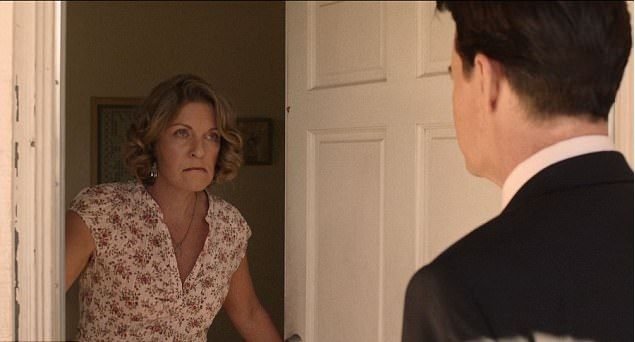
Twin Peaks: The Return - Laura Palmer
Laura's tragic story is the catalyst behind the Twin Peaks and change it completely, vitiating it, especially since this season was further developed, would be a break with the spirit of the series. After all, the original idea of Lora Palmer's killer not being revealed happened to some extent during those last seconds.
The story of the violence against the still-infamous woman has always been the heart and foundation of all the other stories in the series, so he could afford to finish in such a high tone - Laura is undoubtedly doomed and it is deeply upsetting, whether because of the house of the Palmer family is a terrestrial polygon for astral presence or because, in every possible reality, its fate is predetermined. Like Orpheus, who turns to Eurydice before going out of Underworld, Cooper drops Laura back into the nightmare. Her story is a reflection of a myriad of similar happenings in our world. In Lynch and Frost's vision, this narrative seems to be repeated indefinitely, but the struggle against evil forces has at least one Agent Cooper who, like the end in Fire, follow me, where he was next to Laura for consolation, is unbearable.
The black-and-white footage of the film, dedicated to Laura's last days and Cooper's hand at the end of episode 17, puts us on the verge of fate, just as the past begins to dictate the future. If Laura follows Cooper in the woods, the chessboard is instantly rearranged in the starting position. Her father is not a violent, Pete Martel does not find her wrapped in a nylon body, and the quiet town of Twin Peaks is not poisoned at its core. The exposition is reminiscent of Martin Scorsese's epic bible, "The Last Temptation of Christ," in which for a moment we also have the opportunity to see what would happen if the crucified get a chance to get off the cross, leaving the dim forest. Or at Spike Lee's "25th hour," where we finally get a fabulous illusion instead of the actual outing.
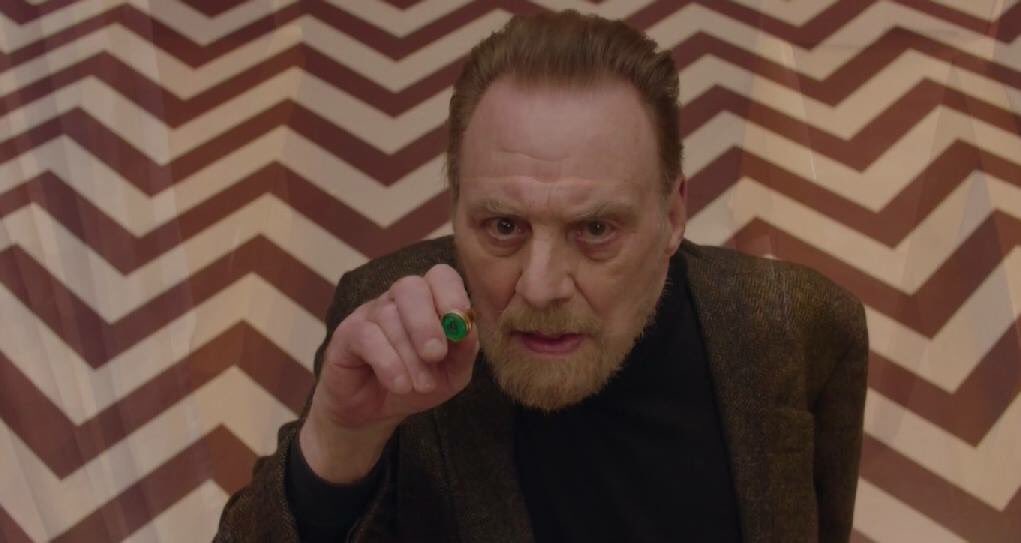
Twin Peaks: The Return - Mike
The psychological fears of the characters in David Lynch's films are often manifested in the form of strange, unknown creatures that hijack the character's home, the only place they would find shelter. The Lost Highway is the Mysterious Man, in Mulholland Drive, Betty's grotesque body, which she finds out before her first awakening. In the first two seasons of "Twin Peaks" is Bob, and with "Ruby Head" is almost everything in the life of the main character. Once they have appeared, these personifications of the character's fears and the viewer's turn become a continually active threat, lush in the atmosphere (the scene in the Mulholand Drive showroom perfectly illustrates this technique, as the thought and perception of the dreadful ugly, emerging around the corner holds us on every time the camera creeps to an open angle). In Return, the Firefighter told Cooper at the very beginning that "it is now in our house", and so summed up the unthinkable series of Black Cooper's machinations we have seen. The gloomy musical theme with which he first appeared in Episode 1 perfectly captures his traumatic movements and the explosive violence he applies to anyone who has walked in his way.
This drastic change, the black skin in which we were forced to watch the self-committed agent Cooper, and to a great extent our favorite series for most of the season, did not come out of the blue. Even in the intro of Return, the change of tone is felt. We see the face of Laura Palmer, which fades over the majestic North American forests, as well as other well-known scenes, but the prospect has changed. As Frost and Lynch say here, the journey that is ahead of us will be a new point of view for the well-known old. And the hypnotic way the installation overlays curtains and floor from the Red Room to reality signals the intertwining of fiction and reality, the well-known old 25 years ago, with the quest for the unknown, which is still a major driving force for David Lynch and Mark Frost. But apart from the magical intro, the show also gave an indication in its general musical plan that it is no longer just a memorable story of the lives of a selected part of the Twin Peaks residents.
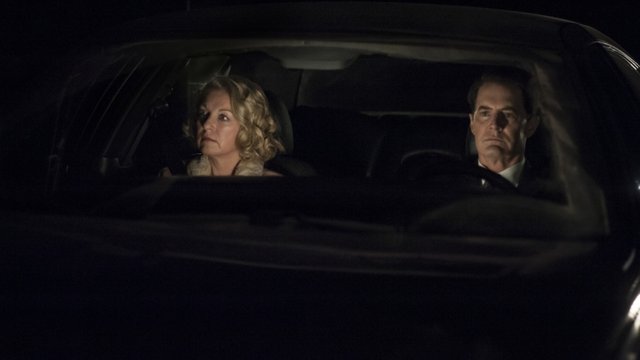
Twin Peaks season 3 episode 18
Lynch says that "my films are 50% vision and 50% sound," and one of the most successful techniques we can easily distinguish in all of his filmography is precisely the ability of music and sounds to unconsciously enhance the atmosphere whether it is romantic (the love song that Sayler sings on Lula in Wildwood), inexplicably sad (the heartbreaking performance at Silencio by Mulholland Drive) or strangely sinister and fun (Dougie Jones in the Red Room). The electrifying tension, mixed with the sounds, can not be fully identified, and so instead of being exposed in front of our eyes, its unusual worlds engage us directly in its polygonal dimensions. This mastery, with which Lynch processes even the daily noise and saturates with (or deprives) of his scenes, gives an elusiveness to his films, which makes them so frightening. (According to a popular formulation by William Burroughs, "paranoid is the one who knows very little about the surrounding environment," and this is the most accurate definition of the situation where director David Lynch places his characters and viewers).
Used sparingly, the familiar soundtrack of the original 2 seasons carried the musical tropics at the most precise moments, turning them into something really special. The theme of Laura Palmer, which sounded when Bobby Briggs saw her graduation portrait for the first time in years, was overwhelming. As when Cooper smelled a "devilish good Joe" glass in Episode 5 and his excitement was highlighted by the well-known Jazz solo drums. Perhaps the greatest impact of such a character was the return of Agent Cooper in episode 16, in which his "I am the F.B.I." was underlined by a variation of the well-known main theme. Thus, despite his constant quest for the unknown, Lynch showed that many of the old injuries and joys in Twin Peaks still play an active role.
But most of the time, "Return" has evolved as a nightmare, instead of relying on lighter humor, so silence along with wind echoes, silent synthesizers, and electric sounds had a significant presence. They highlighted Dr. Jacobi's absurdity spraying with gold spatter shoveling shots, and the sad, corrosive loneliness of Sarah Palmer, a burning cigarette from a cigarette, while watching a wildlife documentary or a boxing match ending in an endless circle .

The new season has affected more mature and darker issues, the development of which would have been incorrectly romanticized by the original soundtrack, whose relative calm would not suit the harsh horror that sank here. An extraordinary moment in which this use of familiar sounds gives context to what is happening is the extraction of Cooper from the Black Lodge in Episode 3. The chaotic descent through space is accompanied by screaming sounds and a disturbed synthesizer, and when he catches his eyes in blind Naydo, the silent synthesizer pauses, releasing a place for more mysterious tones. The heavy thudding on the metal door creates the notion that Cooper is hunted by an unknown force, but everything on the screen is somewhat strange and unprecedented before, only the noise gives context, reminiscent of some of the more intense moments in the original episodes, like the first appearance of Bob to Laura's bed.
Alongside the 18-hour story and the specific vision that any other series looks like to be produced for imitation masses, the series that should reward careful viewing eventually spills this attention back to the viewer. Like the Mulholland Drive, the more we look and listen, the more we get the feeling that someone has pulled the rug out of our legs because Cooper's final attempts in the mission to save Laura have failed.
I return so often to the Mulholland Drive because it perfectly illustrates David Lynch's ability to take us to another place, to feed the joyful and most secret nooks, to tickle us emotionally, without letting us rationally explain his ideas . In Mulholland Drive, Diane committed suicide and ended his story in a minor, almost nihilistic tone. In Twin Peaks, evil seems to be invincible, and Laura's trauma is indelible, but there will always be good enough to counter it. The classical eastern setting for the forces of light and darkness that are in continuous unity.
The third season was a kaleidoscope of interesting ideas, many of which were hardly hinted at, but for the most part, it drew us closer to the screen, breathing in search of more details, to help the various theories trying to solve the mystery. Eventually, the series has always dealt with the varied dimensions of the mystery and secrets we hold, and the final frame on which people's names are behind the "Return," sums up these two basics in the most satisfactory way.
Of all series I have ever seen in my life, this one has to be in the top 3! I can't believe there's a final sequel!?! So, I didn't dare reading the entire article as I am scared of running into a spoiler, especially since I read between the lines too easily...
Thanks a lot for sharing this huge article of high quality. For what I have read, it is very well done. Namaste :)
Downvoting a post can decrease pending rewards and make it less visible. Common reasons:
Submit
Yes there are some spoilers. Watch out :)
Downvoting a post can decrease pending rewards and make it less visible. Common reasons:
Submit
very cute words i am much impressed
Downvoting a post can decrease pending rewards and make it less visible. Common reasons:
Submit
Great post
Downvoting a post can decrease pending rewards and make it less visible. Common reasons:
Submit
WoW! I will be adding this to my watch list :) Best wishes, - @splendorhub
Downvoting a post can decrease pending rewards and make it less visible. Common reasons:
Submit
Although I have never watched Twin Peaks, I will definitely do that. When first seasons came out - I was too little to understand anything. Now it's only a question of time.
Speaking about Lynch, I really liked Inland Empire, it was disturbingly good. The atmosphere is unique.
Thank you for your well-written article!
Downvoting a post can decrease pending rewards and make it less visible. Common reasons:
Submit
Fantastic article! Twin Peaks the return is the best serie of the last years, for sure! Thanks for share your vision!
Downvoting a post can decrease pending rewards and make it less visible. Common reasons:
Submit
Thanks for the article, very insightful! I go every couple days on Youtube looking for new videos/analysis of EP 17/18, I'm still processing what it all meant. It is great to finally find some Twin Peaks fans on Steemit! The Return S3 was definitely a wild ride, I really hope there is a season 4.
Have you read the Secret History of Twin Peaks, the 2016 novel by Mark Frost? Also, there is a new book "The Final Dossier" coming out at the end of October, which I am dying to read and hoping to get some answers from.
Downvoting a post can decrease pending rewards and make it less visible. Common reasons:
Submit
Hi, no I haven't read it but I've heard of this novel. I prefer to buy books translated in my language because I'm not a good english speaker - you can see in the article I'm sure there are some mistakes. I'll check out for some info about the Final Dossier when I'm back at home. Thanks for that!
Downvoting a post can decrease pending rewards and make it less visible. Common reasons:
Submit
A huge fan of the brilliant David Lynch. His work always touches new highs of intellectual art. Mulholland Drive, Blue Velvet etc. left me spellbound! Didn't know Twin Peaks is directed by him. Will definitely watch that :o
Downvoting a post can decrease pending rewards and make it less visible. Common reasons:
Submit
gosh i had NO idea twin peaks was still going i remember this about 20 years ago!
Downvoting a post can decrease pending rewards and make it less visible. Common reasons:
Submit
very memorable, I like movies and I like your posts @cocacho
Downvoting a post can decrease pending rewards and make it less visible. Common reasons:
Submit
Thanks!
Downvoting a post can decrease pending rewards and make it less visible. Common reasons:
Submit
Wow! Nice ...Following you for more.
Downvoting a post can decrease pending rewards and make it less visible. Common reasons:
Submit
@minnowpond1 has voted on behalf of @minnowpond. If you would like to recieve upvotes from minnowpond on all your posts, simply FOLLOW @minnowpond. To be Resteemed to 4k+ followers and upvoted heavier send 0.25SBD to @minnowpond with your posts url as the memo
Downvoting a post can decrease pending rewards and make it less visible. Common reasons:
Submit
Great review. Seems very interesting. Is another season to be on a look out for?
Downvoting a post can decrease pending rewards and make it less visible. Common reasons:
Submit
I think this is the last one.
Downvoting a post can decrease pending rewards and make it less visible. Common reasons:
Submit
Congratulations @cocacho!
Your post was mentioned in the hit parade in the following category:
Downvoting a post can decrease pending rewards and make it less visible. Common reasons:
Submit
Nice post wow !!!
Downvoting a post can decrease pending rewards and make it less visible. Common reasons:
Submit
Wow! Nice ...Following you for more.
Please visit my profile, hope you will like my photography...@saan
Downvoting a post can decrease pending rewards and make it less visible. Common reasons:
Submit
Thanks. Followed you back
Downvoting a post can decrease pending rewards and make it less visible. Common reasons:
Submit
Very detailed. After reading the post it made me interested to watch the show.
Downvoting a post can decrease pending rewards and make it less visible. Common reasons:
Submit